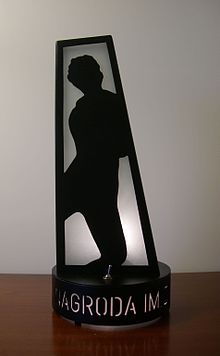Zbyszek Cybulski Award
| Zbigniew Cybulski | |
|---|---|

Zbigniew Cybulski
|
|
| Born |
3 November 1927 Kniaże |
| Died | 8 January 1967 (aged 39) Wrocław |
| Nationality | Polish |
| Other names | Zbigniew Hubert Cybulski |
| Alma mater | Ludwik Solski Academy for the Dramatic Arts |
| Occupation | actor |
| Years active | 1954–1967 |
| Notable work | Kostek in A Generation (1954) Maciek in Ashes and Diamonds (1958) |
| Partner(s) | Elżbieta Chwlibóg (1960-1967) |
| Awards | Złota Kaczka (1996) |
| Zbyszek Cybulski Award | |
|---|---|

Zbyszek Cybulski Award figurine
|
|
| Awarded for | for young film actors with strong individuality |
| Country | Poland |
| Presented by | Film magazine |
| First awarded | 1969 |
| Official website | www |
Zbigniew Cybulski Polish pronunciation: [ˈzbiɡɲɛf t͡sɨˈbulskʲi] (November 3, 1927 – January 8, 1967) was a Polish actor, one of the best-known and most popular personalities of the post-World War II history of Poland.
Zbigniew Cybulski was born November 3, 1927 in a small village of Kniaże near Śniatyń, Poland (now a part of Sniatyn Raion, Ivano-Frankivsk Oblast, Ukraine). After World War II he joined the Theatre Academy in Kraków. He graduated in 1953 and moved to Gdańsk, where he made his stage debut in Leon Schiller's Wybrzeże Theatre. Also, with his friend Bogumił Kobiela, Cybulski founded a famous student theatre, the Bim-Bom. In the early 1960s, Cybulski moved to Warsaw, where he shortly joined the Kabaret Wagabunda. He also appeared on stage at the Ateneum Theatre, one of the most modern and least conservative Warsaw-based theatres of the epoch.
However, Cybulski is best remembered as a screen actor. He first appeared in a 1954 film Kariera as an extra. His first major role came in 1958, when he played in Kazimierz Kutz's Krzyż Walecznych. The same year he also appeared as one of the main characters in Andrzej Wajda's Ashes and Diamonds and Aleksander Ford's The Eighth Day of the Week based on a short story by Marek Hłasko. From then on Cybulski was seen as one of the most notable actors of the Polish Film School and one of the "young and wrathful", as his generation of actors were called at the time.
...
Wikipedia
